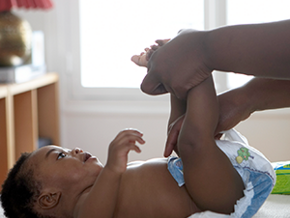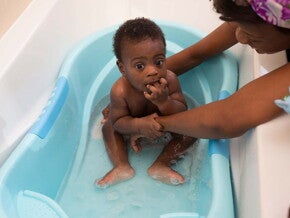
Even before your baby arrives (it’s never too early to start making decisions), you can turn to this guide to help prep your infant feeding plan and find out valuable facts about baby nutrition.
Breast milk is best
Why breast milk? Because it’s:
- Nutrient-rich
- Able to change to meet the nutritional needs of your baby as they grow (with each feeding, really).
- Made to give your baby the best start in life.
- The perfect food for your newborn baby.
Plus, breastfeeding is great for you, too—it can help you:
- Return to your pre-pregnancy weight faster.
- Create an intimate bond between you and your baby.
- Its economical
WHO recommends that
WHO recommends mothers worldwide to exclusively breastfeed infants for the child's first six months to achieve optimal growth, development and health. Thereafter, they should be given nutritious complementary foods and continue breastfeeding up to the age of two years or beyond. (WHO, 2011)
Your infant feeding plan
How you feed your baby is a very personal decision. Here’s what you should consider while you personalize your plan.
- Base it on the right information, advice and support from your healthcare professional
- Know that breast milk is the ideal food for your baby during the first six months of her life.
- Speak to your health care professional for support on breastfeeding milk and any other information related to infant feeding
As you get ready to give your baby all the nourishment she’ll need by developing an infant feeding plan—consider this:
- Healthy Mum, healthy Baby
- Eat healthy (and enough. Newborns feed every 2-3 hours, so you need to eat, too).
- Hydrate.
- Get lots of rest.
- Call on family and friends for help around the house
- Learn about breastfeeding
Ready, set, breastfeed! Make it a fulfilling experience for both of you by arming yourself with helpful hints, as well as tips on how to cope with challenges.
- Get right to it!
- Breastfeed ASAP after birth (within 30 to 60 minutes is recommended if you are healthy enough to do so).
- Hold your baby skin-to-skin often to promote successful breastfeeding initiation.
- Confirm your hospital supports 24-hour rooming-in to keep your baby close to you
- Your growing baby needs iron
As you strengthen your iron knowledge with the info below, know that your baby’s initial iron reserves may start to run low at about the 6-month mark.
Why iron?- It’s a vital nutrient that contributes to the normal growth and development of your baby.
- It’s essential in building red blood cells that transport oxygen throughout the body.
How can your baby get iron?- Healthy full term infants are born with iron stores, which meet their needs until about 6 months of age.
- Your own iron-rich diet will help ensure that these stores stay topped up.
- Breast milk will provide your baby with adequate iron for those first 6 months.
- Introduce iron-rich complementary foods after the 6-month mark.
- Yep, your baby will be ready to start eating complementary foods by around 6 months.
- The introduction of foods is a steady progression of single ingredients and portion sizes between 6 and 12 months of age.
- WHO recommends baby’s complementary foods be iron-rich.
- Healthy iron-rich options are meat, meat alternatives and iron-fortified Infant cereal.
- Babies should be offered iron-rich foods 2 or more times a day.1,2
Still not sure how to meet your baby’s iron needs once she’s accustomed to complementary food? Just follow the nutrition recommendations in the chart below.3
Ironclad Reminders
- Breastfeeding is ideal—and it’s nature’s way of delivering iron to your baby for the first 6 months.
- Introduce iron-rich foods at around 6 months of age
- Store all vitamin supplements that contain iron, including your prenatal and postpartum vitamins, out of children's reach—large amounts can be harmful (You’ll have them on hand, especially if your healthcare professional has advised supplementing your baby’s diet with iron in addition to breastfeeding).
- Call your doctor or visit your local emergency room immediately if you suspect excessive iron intake
Talk to your doctor about your baby’s iron needs and iron deficiency. Iron deficiency can cause your baby to be less active than usual, and perhaps even develop more slowly.
DHA and ARA
You’re probably aware of these two fatty acids that offer health benefits: DHA (which is docosahexaenoic acid), is an omega-3 fat, and ARA (arachidonic acid), is an omega-6 fat.
What makes them so important?
Experts agree that DHA and ARA are essential for healthy brain and eye development4,5 (they actually accumulate in the brain and eye tissue of your baby before birth).
The earlier you can start getting DHA, a major brain-nourishing nutrient, the better—up to 90% of your baby’s brain growth will be complete by age three6.
How do I get them?
Your body will produce DHA and ARA from two essential omega-3 and omega-6 fatty acids: alpha-linolenic (ALA) and linoleic acid. It all starts though, with your healthy diet—so eat foods rich in DHA5, like:
- Fatty fish: Atlantic salmon, herring, mackerel, sardines and cod are your best DHA bets (in that order).
- Flaxseed and walnuts: Decent sources, yes, but you’ll only get a small amount of DHA once your body processes these.
How does my baby get them?
These nutrients are passed through your breast milk.
Plus, your baby’s body produces them the same way yours does. These essential fatty acids are also found in a variety of complementary foods5 - so look out for them when you’re making your feeding choices.
Your healthcare professional can answer any more of your questions about DHA and ARA.
The Pros of Probiotics: Developing Your Baby’s Immune System
Ah, yes, another miracle of nature—your baby’s developing immune system, it works hard as a:
- Shield from sickness and infection.
- Main support in her growth and overall health.
- Key in maintaining natural protective barriers.
The skin is obviously most important for protection, but another important barrier is the digestive tract, which is home to:
- 80% of the body's immune cells.7
- The gut flora (diversity of bateria in gut), a delicately balanced community of around 500 different kinds of bacteria.
In a healthy digestive system, part of the task of keeping baby’s immune system and body safe from illness relies on good bacteria (or bacterial cultures)—they can also help to balance potentially harmful bacteria. One way to help support this protective barrier is to increase the levels of good bacteria in your baby’s digestive tract.
Recent research has shown that breast milk naturally contains probiotics including Bifidobacteria8,9that:
- Are good bacteria
- Make up to 90% of the naturally occurring bacteria found in the gut flora of healthy, breastfed babies.10
- Aid in building a healthy digestive tract flora.
- Help with the healthy development of a strong immune system.11,12
These facts alone make it easy to see why breast milk is an ideal source of probiotics for your baby.
What are probiotics?
The meaning of “probiotic” is literally “for life”. Probiotics are live, safe microorganisms, found in food and you’ll also hear them called “natural cultures” or “good bacteria”.
They offer specific health benefits, like aiding in digestion and supporting the immune system, when taken in adequate amounts.13
The probiotic Bifidobacterium lactis or B. lactis is a common type of Bifidobacteria and is recognized as a probiotic that contributes to baby’s healthy digestive tract flora.14 B. lactis has also been extensively studied for its health benefits in infants.
Research suggests that, when ingested, probiotics only temporarily reside in the digestive system11,13,14 and continued, daily consumption of B. lactis is necessary for health benefits.14,15
B. lactis has been shown to help increase levels of antibodies, the immune protectors of your body, and an important part of a healthy baby's immune system and natural defences.15,16,17
References:
- Joint statement of Health Canada, Canadian Paediatric Society, Dietitians of Canada, and Breastfeeding Committee for Canada. Nutrition for Healthy Term Infants: Recommendations from Birth to Six Months. 2012.
- Joint statement of Health Canada, Canadian Paediatric Society, Dietitians of Canada, and Breastfeeding Committee for Canada. Nutrition for Healthy Term Infants: Recommendations from Six to 24 Months. 2014.
- Adapted from the American Dietetic Association and Dietitians of Canada. Manual of Clinical Dietetics, Library of Congress Cataloging-in-Publication Data, Chicago.
- FAO/WHO Joint Expert Consultation. Report of a joint expert consultation: FAO Food and Nutrition paper No. 57, Rome, 1994. p.49-55.
- Dietitians of Canada. Food Sources of Omega-3 Fats. Posted Oct 28, 2016. Accessed June 9, 2017.
- Physical Appearance and Growth: Your 1 Year Old. Accessed June 29, 2017.
- Brandtzaeg P et al. Gastroenterol 1989; 97:1562-84.
- Gueimonde M et al. Neonatology 2007;92:64-6.
- Martin R et al. Appl Environ Microbiol 2009; 75(4): 965-9.
- . Yoshioka H et al. Pediatrics 1983;72:317-21.
- Saavedra, JM. Nutr Clin Pract 2007;22(3): 351-65.
- Marchand et al. Using probiotics in the paediatric population. Paediatric Child Health 2012; 17(10):575 (Reaffirmed Feb 28 2015).
- Joint FAO/WHO Expert Consultation on Evaluation of Health and Nutritional Properties of Probiotics in Food including Powder Milk with Live Lactic Acid Bacteria, October 2001.
- 1 Health Canada. Accepted Claims about the Nature of Probiotic Micro-organisms in Food. April, 2009. Available at:
- Fukushima Y et al. Int J Food Microbiol 1998; 42:39-44.
- Holscher HD et al. J Parenter Enteral Nutr 2012;36:106S-117S.
- Mohan R et al. Pediatr Res 2008;64(4):418-422.

















